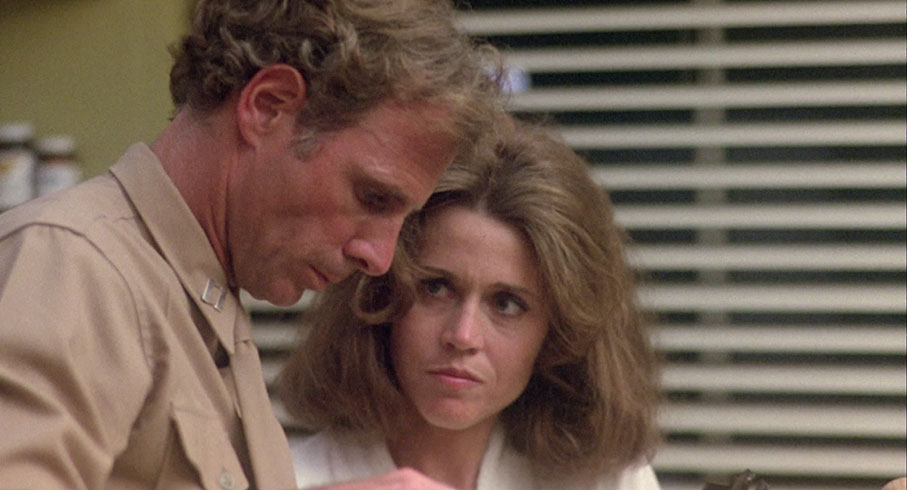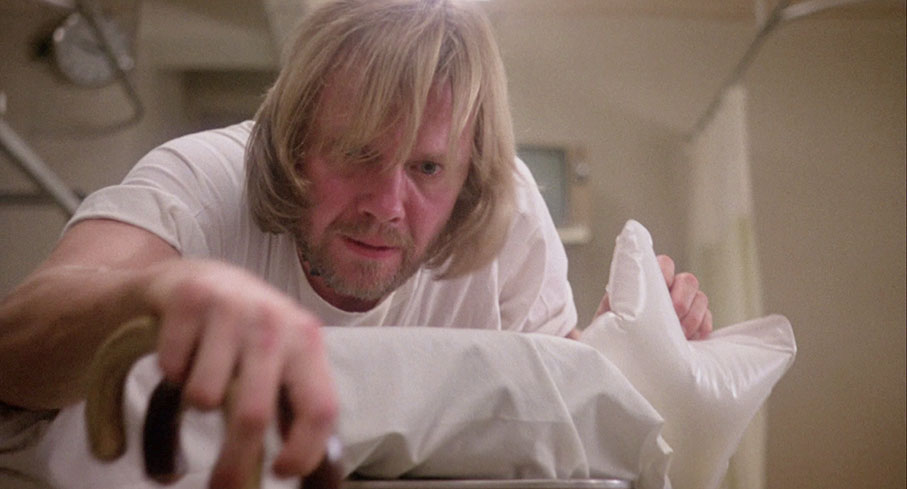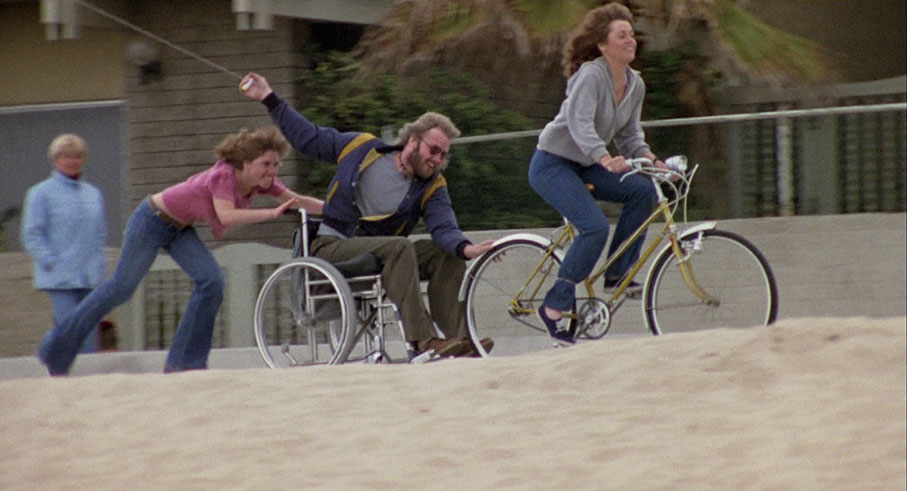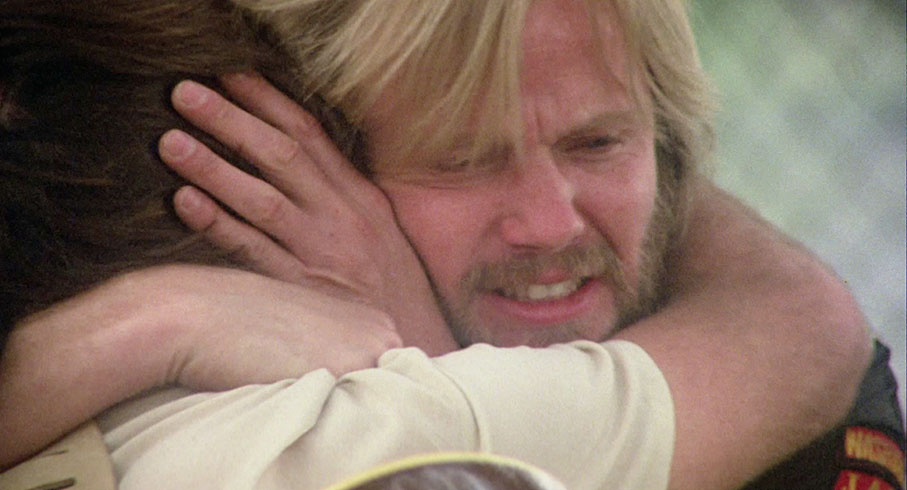|
I'm guessing that a good many people of my age or younger, especially those living outside of the USA, were for many years unaware of Ron Kovic, who voluntarily joined the marines to fight in the Vietnam War and even signed up for a second tour of duty, during which he suffered an injury that paralysed the lower half of his body. Kovic was awarded the Bronze Star and the Purple Heart, but two years after his return to American soil he became an active protestor against a war he once supported but now believed was destroying the lives of young men for no good reason. His story eventually became the subject of a Hollywood film, one based on his autobiography titled after the ironically patriotic date of his birth, Born on the Fourth of July. This was the second film in Oliver Stone's Vietnam trilogy and landed him his second Best Director Oscar, but it wasn't the first film – not the first Oscar-winning film – inspired by Kovic's post-Vietnam experiences.
There are a few ways in which the 1978 Coming Home stands apart from the other, sometimes more widely seen and celebrated Vietnam themed movies of the late 70s and early 80s. The first comes in the opening scene, whose abrupt start and top-down lighting give it the feel of a documentary that we've stumbled into midway, as a group of physically handicapped Vietnam veterans play pool and share their views about the war and its effect on their lives. It looks and sounds real, but that's because it is. Aside from the presence of a largely silent Jon Voigt, all of the participants are actual disabled Vietnam War veterans who have been encouraged to express their views on the conflict and its aftermath, while the camera crew observe from a fixed position and shoot whatever strikes them as relevant. It's a quietly arresting opening that also subtly establishes the tone and the approach of the film that is about to unfold.

We then meet loyal army wife Sally Hyde (Jane Fonda) and her husband Bob (Bruce Dern), a US Marines Captain who is preparing for a tour of duty in Vietnam, which he believes will further his military career. On the night of his departure, he says a loving goodbye to Sally, then he and his good friend Sergeant Dink Mobley (Robert Ginty) board a military bus and head off to the war. It's shortly after this that we'd normally get our first footage of Bob and Dink as they get their first taste of the realities of combat duty in Vietnam, but in Coming Home, that moment never comes. Instead the film stays with Sally as she adjusts to Bob's departure and the upheaval to her life that it causes, as she is forced to move out of the apartment she and Bob shared on the military base and find her own place, a task in which he is aided by Dink's bohemian girlfriend Vi (Penelope Milford). The two women become friends, and with little to occupy her days in Bob's absence, Sally takes her cue from Vi and volunteers at the local veterans' hospital. Here she literally bumps into former high school classmate Luke Martin (Jon Voigt), who has sustained an injury in Vietnam that has left him paralysed from the waist down and furious at what he sees as the lack of humanity being shown to those in his condition. Despite some moments of angry confrontation between them, Sally connects with Luke, and when he is released from hospital their growing friendship looks set to develop into something stronger.
Reading that plot summary back makes Coming Home sound more like a soap opera than the emotionally affecting Vietnam War-themed drama that it most definitely is. Some of what makes it so effective I can't get into in detail without stumbling into spoiler territory (I'm likely to do that anyway but warnings will be given), but a little expansion on aspects of the above outline should give a flavour of why the film is held in such high regard. The first clue comes in that opening scene, whose air of realism is carried through to the sequences in the VA hospital, whose patients are also not actors but actual paraplegics, some of them left handicapped by their service in the Vietnam War. In this respect, Luke's explosive anger, although sometimes misdirected at those trying to help him, is not just understandable, it gives voice to the frustrations of these young men whose lives have been so dramatically impacted by a conflict that they no longer believe in. The film is also careful to show that the mind as well as the body can fall victim to the damaging effect of war, notably when Sally meets Vi's brother Billy (Robert Carradine), a young man of talent and promise who is now a patient in the hospital's psychiatric ward after being drafted and then shipped home suffering from post-traumatic stress disorder.

Coming Home is built on the solid foundations of an impressively structured screenplay that underwent two major revisions, the first by Waldo Salt, who completely rewrote Nancy Dowd's original script, and then again by Robert C. Jones in collaboration with director Hal Ashby. You can find more details of the changes the script underwent in the special features on this disc, but the final revision gets the balance between the personal and the political just right and communicates its message about the damaging effects of war and the treatment of returning veterans by personalising the issues and never playing like a polemic. Much of this is down to the restraint and sensitivity of Ashby's direction, which eschews dramatic camera angles and edits in favour of a more observational and naturalistic approach, which effectively dissolves whatever barrier might have existed between the scripted elements and the almost documentary realism of the VA hospital sequences. He's aided immeasurably by master cinematographer, political activist and Medium Cool director Haskell Wexler, whose naturalistic lighting, subtly unobtrusive pans and dolly shots and use of longer lenses to shrink the depth of field or give the actors room to explore the emotion of a scene work sublimely for Ashby's approach to the material.
This all combines harmoniously to sell Luke, Sally and Bob as real people rather than scripted characters played by professional actors, each of whom commits so completely to their roles that I genuinely forget I'm watching performers who would have been instantly recognisable even back in 1978. When Sally tours the hospital offering drinks to the patients and awkwardly helps to feed a man who has lost not just the use of his body but his ability to speak, I always feel that I am watching Sally adapt to her new position and not Jane Fonda playing a woman who is trying to do likewise. And when Luke loses his rag after bumping into Sally and starts furiously smashing everything within reach with his walking stick, his anger is so painfully real and so brilliantly, desperately true to life (how hard it is to get this level of anger right) that only later did I look back and appreciate the small miracles that Jon Voight worked with that crucial sequence. Voight, Fonda and Dern are just terrific here, something they credit as much to their passion for the project as the work of a director they all deeply admired and enthusiastically responded to. And while Dern's contribution (spoilers ahead, so hop to the next paragraph to avoid them) may be limited to the bookends of the film and a key scene when Sally visits him in Hong Kong while he is on R&R, his work here is utterly crucial to the story and to its message. And the film really credits the audience here. We don't get to see or even hear about what happens to transform Bob from the optimistic officer who ships out at the start of the film to the broken man whose discharge may or may not be due to a self-inflicted gunshot wound, but we can draw so much from Dern's words, expressions and behaviour both in Hong Kong and on his return to American soil. His final scene is particularly poignant, and intercut as it is with a speech given by transformed and passionate Luke (all three lead characters experience a major transformation during the course of the film) to a group of college students about his experiences and how they have shaped his beliefs, it underscores the difficulty faced by those left physically and mentally damaged by war, how the paths of hope and hopelessness can both originate from the exact same point and how the simplest of things can result in you heading down one route instead of the other.

In common with seemingly every film made after Easy Rider and set in the late 1960s, the soundtrack of Coming Home is liberally peppered with popular songs of the era, with a particular emphasis here on tracks by The Rolling Stones. While a few of them are a little too on-the-nose, commenting on an aspect of a scene in a manner that brings it perilously close to overstatement, they are at their most effective when the tone rather than the lyrics of the song underscores and enhances the mood of a sequence. What's particularly interesting here is their sometimes uncertain or even shifting diegesis, which blurs the line between songs that are on the film's soundtrack and those that are playing in a scene on a radio or record player, and just occasionally they switch almost invisibly from one to another. This diegetic shift is neatly but subtly showcased when a contemplative Sally opens the door to her empty garage and walks slowly back to the house to the opening strains of Buffalo Springfield's Stop Children What's That Sound (you'll need to see the film to understand the thrust and emotion of this moment). The song then provides a musical bridge to the shot that follows of Luke at his home tuning up his wheelchair, but when the task is interrupted by a phone call, Luke asks the caller to hold on and leans over to lower the volume on his record player and the music drops accordingly, only to rise in volume again as we cut to the shots of seriously injured vets arriving home on a transport plane.
It's quite possible that the real-world political views of the lead actors impacted on how the film played in 1978, and for different reasons they still do today. Jane Fonda was a very vocal and active opponent of the Vietnam War, and in 1972 she travelled to Hanoi to see for herself the damage done by American bombing. While there she posed for a photo whilst sitting on a North Vietnamese anti-aircraft gun, an image that angered veterans and non-veterans alike and gave rise to the nickname ‘Hanoi Jane'. It's an incident she later expressed deep regret over, and her efforts to highlight the plight of injured veterans on their return to home soil and the damage being done to a generation of young men were driving factors in getting Coming Home to the screen, which was the first feature made by Fonda's own production company, IPC Films. All of the principal participants in the film were active in their opposition to the war, including director Hal Ashby, cinematographer Haskell Wexler and co-star Jon Voigt, who used to campaign alongside Fonda and tour college campuses with a slideshow in the hope of educating students about the realities of this increasingly unpopular war. In an interview shot in 2002 for one of the special features on this disc and the accompanying commentary, Voigt was still proud of what he and his colleagues achieved with the film, but just six years later he appears to have undergone a mystifying transformation, and in an interview with the Washington Post expressed deep regret for his protest days and has since become one of the most notable cheerleaders for Donald Trump, whom he once described as the greatest president since Abraham Lincoln. What? Sorry John, but in a week where that disgusting and narcissistic would-be dictator has whipped up racial hatred against four prominent and outspoken congresswomen of colour whom he regards as a threat to his manhood because they're smarter than him, statements like that make my skin crawl.

So, given my own firmly entrenched political convictions, did any of this this colour how I viewed the film? Not in the least. Yes, it was at the back of my mind when digesting the special features, but just as I salute James Woods for his electrifying central performance in Salvador despite being repulsed by his current right-wing ravings, I have no problem doing likewise for Voight's consistently excellent work in a film that he absolutely believed in when it was made. I'd agree with those who suggest that some understanding of the war and the politics of late 60s America was necessary for full appreciation of the film and what it has to say, and if your knowledge of the subject is in any way lacking (and that's not meant as a criticism given that this all happened before some of you reading this were born), I heartily recommend Ken Burns and Lynn Novick's superb documentary series The Vietnam War (whose soundtrack is also driven by popular songs of the period), which at the time of writing is still available on Netflix.
In its decision to include no combat footage and focus exclusively on the physical and psychological damage that being exposed to it can cause, Coming Home differs markedly from the other major Vietnam War-themed films of the period, but is no less effective for it. It's a work where no-one involved puts a foot wrong, including a stellar supporting cast that includes John Carpenter favourite Charles Cyphers as a hospital orderly and current TV's coolest septuagenarian Jonathan Banks as one of Bob's army drinking buddies. Still relevant in its message and still deeply moving (the sequence in which Luke comforts Billy when he breaks down midway through the performance of a song is heartbreakingly real), Coming Home is a prime example of just what can be achieved when talented individuals united in a common cause at a time when critically and commercially successful American cinema had something socially relevant to say.
A seriously impressive 1.85:1 1080p transfer that really allows Haskell Wexler's captivatingly naturalistic cinematography to shine. Despite his use of a partial fog filter to add a slight softness to some sequences, the detail is crisply rendered and the contrast is very well balanced even in darker interiors, in part due to the manner in which they are lit. The colours have a natural feel but can pop attractively when the lighting allows, and a very fine film grain is visible (on the second commentary track, Wexler reveals that he always liked to use the slowest speed film stock he could and would light to allow for this). As you would hope for a studio restoration, the picture is free of dust and damage. A lovely job.

The Linear PCM 2.0 mono soundtrack is also impressive, with a very decent dynamic range for a mono track and clear reproduction of dialogue, effects and especially music, which always sounds good here. There is never a sense that this is less than it could be. No damage or background fluff and hiss was detected.
Optional English subtitles for the deaf and hearing impaired are available.
Audio Commentary by Author Scott Harrison
I'm not sure if novelist and scriptwriter Scott Harrison is new to audio commentaries or is by nature a hesitant speaker, but his habit of pausing midway through sentences for seconds at a time did occasionally prompt me to start finishing them for him. I'm guessing his notes also occasionally let him down a little, as he mislabels Ken Russell's Valentino as "Valentine," John Carpenter's Someone's Watching Me as "Someone's Watching Over Me" and mixes up his John Schlesinger films when he describes Day of the Locust as a World War 2 drama (it's set in Hollywood in the 1930s). But these are trivial blips in an otherwise enthralling commentary that, as promised at its start, covers lots of ground, including Hal Ashby's career as an editor and director, the origins of the project and changes made during the three drafts of the screenplay, Jane Fonda's trip to Hanoi and outrage it provoked, and a good deal more. He highlights the work of several of the actors (including Charles Cyphers – hoorah!), provides some really useful background information on the social and political situation of the time in which the film is set, and passes comment on other Vietnam War themed movies of the period and some of the songs used in the film. He also takes specific issue with aspects of a contemporary review by Jonathan Rosenbaum, picking up points that he addresses in some detail. Have patience with this one and it will be rewarded.
Audio Commentary by Jon Voight, Bruce Dern & Haskell Wexler
The first of three special features that originated on an MGM DVD from 2002 and were carried over onto 2014 American Blu-ray release on the Kino Classics label is a superb inclusion. All three of the participants were recorded separately (Voight and Wexler whilst watching the film and Dern in what sounds more like an interview) and at the time of recording were all proud of what they had achieved with the film. The commentary itself is crammed to the gills with enthralling stories and information on the making of the film and the background to it. Voight's observations are always of interest, whether it be his comments on the soundtrack songs, the roles played by real spinal injury victims and veterans, or his memories of prepping for and shooting specific scenes. Dern's contributions are restricted to when his character is on screen, but much of what he has to say is riveting, from his story of Wexler unofficially grabbing a shot of him running on military property, to his description of the difficulties of shooting in Hong Kong and his affection and respect for Hal Ashby, whom he describes as "big, big stuff." I'm biased, of course, but for me the best material of all comes from Haskell Wexler when he breaks down how he lit specific scenes, in the process providing a small masterclass in the fine details of naturalistic lighting. He also hits the nail on the head when he describes Coming Home as "a truly patriotic film" and adds that "there are many ways to show patriotism besides being a good soldier." There's loads more. An essential companion to the film.

Coming Back Home (24:55)
A 4:3 framed, standard definition featurette that was made for the earlier MGM DVD release and is built around interviews with Jon Voight, Bruce Dern and Haskell Wexler. Inevitably, it covers some of the same ground as their commentary, but there is material specific to this extra. Voight recalls working with paraplegics, learning to use and manage the wheelchair and his early insecurities about his role, while Dern looks back at being able to put the method acting he studied into practice and remembers the first letter he received about the film after it was released. He also describes the screening at Cannes as "the single most emotional experience I have ever had."
Hal Ashby: A Man Out of Time (15:24)
A companion piece to the above featurette, one that focuses on director Hal Ashby, with Voight, Dern and Wexler here joined by director Norman Jewison, who effectively mentored Ashby when he was an editor and remembers him as one of the most talented people he's worked with. Wexler looks back at his working relationship with Ashby and describes him as "a hippy before there were hippies," Voight recalls him finding ways to make you laugh even when he was dying, and Dern has fond memories of his Director's Guild memorial, including an affectionate stunt by Sean Penn.
Original Theatrical Trailer (2:03)
A 4:3-framed, standard definition trailer set largely to Simon & Garfunkel's Bookends that focuses primarily on the love triangle, then the sparks fly in a confrontation from the film's final 10 minutes. Another trailer best saved until after the first viewing of the film.
Booklet
After the main credits there is a typically fine essay on the film it by Glenn Kenny, who hits the nail on the head when he states that the film's easy naturalism can "make you believe it comes directly from the time almost ten years prior to its shooting in which it is set." He also picks up on the diegetic shifts that the music undergoes, slapping down my misapprehension that I'd managed to note something that everyone else had missed. This is followed by a well-researched article on the film and director Ashby by Scott Harrison, who expands on some of the observations made in his commentary and goes into some detail about the film's production. The booklet is illustrated with production stills and a handful of international posters.
Despite never setting foot in Vietnam, Coming Home, the penultimate film of an extraordinary run of rightly celebrated works that Hal Ashby directed during the 1970s, remains one of the most affecting films about the impact that the Vietnam War had on those who fought in it. Eureka's Blu-ray boasts a terrific transfer and not only includes all the extras from the American Kino Classics release, but adds a second commentary and a booklet, both of which are very worthwhile companions to the film. Highly recommended.
|